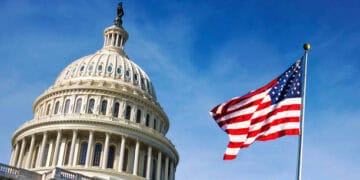BOSTON, Jan 10 (Reuters) – During her visit to Roxbury Community College in Boston, Treasury Secretary Janet Yellen expressed concerns on Wednesday about former President Donald Trump’s tariff proposal. She stated that the plan, which involves a 10% increase in tariffs across the board, could lead to higher costs for U.S. consumers. However, Yellen acknowledged that while some tariffs are necessary, the current administration is reviewing those related to China.
Trump, seeking the Republican nomination for the 2024 presidential election, has advocated for stronger tariffs, including a universal 10% tariff on all imports into the U.S. and the revocation of China’s most-favored-nation trading status. This status, assigned in 2001, allows China to benefit from the lowest World Trade Organization tariffs on many goods that are currently exempt from punitive tariffs.
Yellen referenced the tariffs imposed by Trump on Chinese goods during his presidency, which were a response to what he deemed as Beijing’s “unfair trade policies” and their impact on the United States. These tariffs affected over $300 billion worth of Chinese imports and were a significant aspect of the U.S.-China trade war.
The Biden administration, according to Yellen, is conducting a review of these tariffs to potentially apply them in a more strategic manner than their initial implementation. The review comes as the administration focuses on ensuring diversified supply chains and fostering job creation in future industries like clean energy and semiconductors.
While Yellen did not specify how the China tariffs might be adjusted, she emphasized the importance of such measures in securing diversified supply chains and supporting emerging industries. Reports suggest that the Biden administration may consider increasing tariffs on Chinese-made electric vehicles and other clean-energy products.
In addition to discussing tariffs, Yellen highlighted the benefits of clean-energy tax credits under the Biden administration’s Inflation Reduction Act, aimed at reducing expenses for U.S. households.
BOSTON, Jan 10 (Reuters) – During her visit to Roxbury Community College in Boston, Treasury Secretary Janet Yellen expressed concerns on Wednesday about former President Donald Trump’s tariff proposal. She stated that the plan, which involves a 10% increase in tariffs across the board, could lead to higher costs for U.S. consumers. However, Yellen acknowledged that while some tariffs are necessary, the current administration is reviewing those related to China.
Trump, seeking the Republican nomination for the 2024 presidential election, has advocated for stronger tariffs, including a universal 10% tariff on all imports into the U.S. and the revocation of China’s most-favored-nation trading status. This status, assigned in 2001, allows China to benefit from the lowest World Trade Organization tariffs on many goods that are currently exempt from punitive tariffs.
Yellen referenced the tariffs imposed by Trump on Chinese goods during his presidency, which were a response to what he deemed as Beijing’s “unfair trade policies” and their impact on the United States. These tariffs affected over $300 billion worth of Chinese imports and were a significant aspect of the U.S.-China trade war.
The Biden administration, according to Yellen, is conducting a review of these tariffs to potentially apply them in a more strategic manner than their initial implementation. The review comes as the administration focuses on ensuring diversified supply chains and fostering job creation in future industries like clean energy and semiconductors.
While Yellen did not specify how the China tariffs might be adjusted, she emphasized the importance of such measures in securing diversified supply chains and supporting emerging industries. Reports suggest that the Biden administration may consider increasing tariffs on Chinese-made electric vehicles and other clean-energy products.
In addition to discussing tariffs, Yellen highlighted the benefits of clean-energy tax credits under the Biden administration’s Inflation Reduction Act, aimed at reducing expenses for U.S. households.















